《现代管理学 Modern Management》课程教学课件(讲稿)Introduction to Management
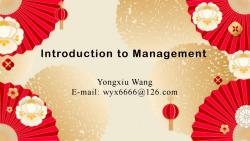
Introduction to Management Yongxiu Wang E-mail:wyx6666@126.com
Introduction to Management Yongxiu Wang E-mail: wyx6666@126.com

ABC PART 01 Course Description Modern Management
Course Description - Modern Management PART 01
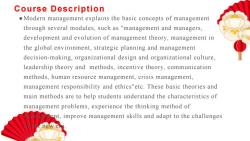
Course Description Modern management explains the basic concepts of management through several modules,such as "management and managers, development and evolution of management theory,management in the global environment,strategic planning and management decision-making,organizational design and organizational culture, leadership theory and methods,incentive theory,communication methods,human resource management,crisis management, management responsibility and ethics"etc.These basic theories and main methods are to help students understand the characteristics of management problems,experience the thinking method of ent,improve management skills and adapt to the challenges
Course Description ●Modern management explains the basic concepts of management through several modules, such as "management and managers, development and evolution of management theory, management in the global environment, strategic planning and management decision-making, organizational design and organizational culture, leadership theory and methods, incentive theory, communication methods, human resource management, crisis management, management responsibility and ethics"etc. These basic theories and main methods are to help students understand the characteristics of management problems, experience the thinking method of management, improve management skills and adapt to the challenges of the new era
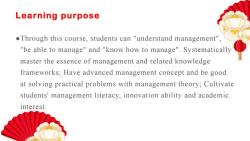
Learning purpose .Through this course,students can "understand management", "be able to manage"and "know how to manage".Systematically master the essence of management and related knowledge frameworks;Have advanced management concept and be good at solving practical problems with management theory;Cultivate students'management literacy,innovation ability and academic interest
Learning purpose ●Through this course, students can "understand management" , "be able to manage" and "know how to manage". Systematically master the essence of management and related knowledge frameworks; Have advanced management concept and be good at solving practical problems with management theory; Cultivate students' management literacy, innovation ability and academic interest
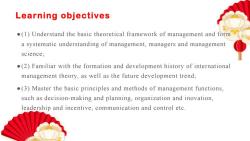
Learning objectives (1)Understand the basic theoretical framework of management and form a systematic understanding of management,managers and management science; (2)Familiar with the formation and development history of international management theory,as well as the future development trend; (3)Master the basic principles and methods of management functions, such as decision-making and planning,organization and inovation, leadership and incentive,communication and control etc
Learning objectives ●(1) Understand the basic theoretical framework of management and form a systematic understanding of management, managers and management science; ●(2) Familiar with the formation and development history of international management theory, as well as the future development trend; ●(3) Master the basic principles and methods of management functions, such as decision-making and planning, organization and inovation, leadership and incentive, communication and control etc
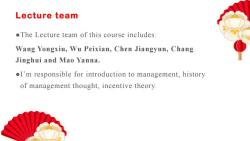
Lecture team .The Lecture team of this course includes: Wang Yongxiu,Wu Peixian,Chen Jiangyun,Chang Jinghui and Mao Yanna. oI'm responsible for introduction to management,history of management thought,incentive theory
Lecture team ●The Lecture team of this course includes: Wang Yongxiu, Wu Peixian, Chen Jiangyun, Chang Jinghui and Mao Yanna. ●I’m responsible for introduction to management, history of management thought, incentive theory
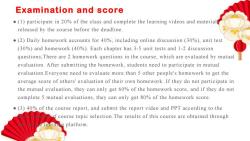
Examination and score .(1)participate in 20%of the class and complete the learning videos and material released by the course before the deadline .(2)Daily homework accounts for 40%,including online discussion(30%),unit test (30%)and homework (40%).Each chapter has 3-5 unit tests and 1-2 discussion questions;There are 2 homework questions in the course,which are evaluated by mutual evaluation.After submitting the homework,students need to participate in mutual evaluation.Everyone need to evaluate more than 5 other people's homework to get the average score of others'evaluation of their own homework.If they do not participate in the mutual evaluation,they can only get 60%of the homework score,and if they do not complete 5 mutual evaluations,they can only get 80%of the homework score. .(3)40%of the course report,and submit the report video and PPT according to the of course topic selection.The results of this course are obtained through e platform
Examination and score ● (1) participate in 20% of the class and complete the learning videos and materials released by the course before the deadline. ● (2) Daily homework accounts for 40%, including online discussion (30%), unit test (30%) and homework (40%). Each chapter has 3-5 unit tests and 1-2 discussion questions;There are 2 homework questions in the course, which are evaluated by mutual evaluation. After submitting the homework, students need to participate in mutual evaluation.Everyone need to evaluate more than 5 other people's homework to get the average score of others' evaluation of their own homework. If they do not participate in the mutual evaluation, they can only get 60% of the homework score, and if they do not complete 5 mutual evaluations, they can only get 80% of the homework score. ● (3) 40% of the course report, and submit the report video and PPT according to the requirements of course topic selection.The results of this course are obtained through the online learning platform
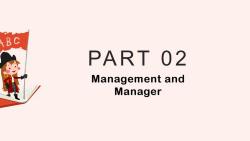
BC PART 02 Management and Manager
Management and Manager PART 02
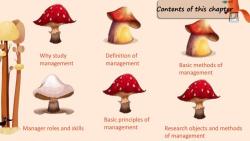
Contents of this chapter Why study Definition of management management Basic methods of management Basic principles of Manager roles and skills management Research objects and methods of management
Contents of this chapter Why study management Definition of management Manager roles and skills Basic principles of management Basic methods of management Research objects and methods of management
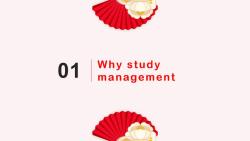
01 Why study management
01 Why study management
按次数下载不扣除下载券;
注册用户24小时内重复下载只扣除一次;
顺序:VIP每日次数-->可用次数-->下载券;
- 石河子大学:《旅游规划与开发》课程教学资源(PPT课件)第七章 旅游规划与开发的项目创意设计 第二节 旅游规划与开发项目创意设计的原则.ppt
- 石河子大学:《旅游规划与开发》课程教学资源(PPT课件)第七章 旅游规划与开发的项目创意设计 第三节 旅游项目创意设计的内容与程序.ppt
- 石河子大学:《旅游规划与开发》课程教学资源(PPT课件)第六章 旅游规划与开发的主题定位和功能分区 第二节 旅游规划与开发的主题形象定位.ppt
- 石河子大学:《旅游规划与开发》课程教学资源(PPT课件)第七章 旅游规划与开发的项目创意设计 第一节 旅游项目创意设计的概念.ppt
- 石河子大学:《旅游规划与开发》课程教学资源(PPT课件)第六章 旅游规划与开发的主题定位和功能分区 第三节 区域旅游空间功能分区.ppt
- 石河子大学:《旅游规划与开发》课程教学资源(PPT课件)第六章 旅游规划与开发的主题定位和功能分区 第一节 旅游规划与开发的主题定位.ppt
- 石河子大学:《旅游规划与开发》课程教学资源(PPT课件)第五章 旅游规划与开发的市场分析与营销对策 第三节 旅游规划与开发的营销对策.ppt
- 石河子大学:《旅游规划与开发》课程教学资源(PPT课件)第五章 旅游规划与开发的市场分析与营销对策 第二节 市场调研与市场分析的程序和方法.ppt
- 石河子大学:《旅游规划与开发》课程教学资源(PPT课件)第五章 旅游规划与开发的市场分析与营销对策 第一节 市场分析的内容.ppt
- 石河子大学:《旅游规划与开发》课程教学资源(PPT课件)第四章 旅游资源的分类体系与评价 第四节 旅游资源调查方法.ppt
- 石河子大学:《旅游规划与开发》课程教学资源(PPT课件)第四章 旅游资源的分类体系与评价 第二节 旅游资源综合评价.ppt
- 石河子大学:《旅游规划与开发》课程教学资源(PPT课件)第四章 旅游资源的分类体系与评价 第三节 游资源综合评价方法.ppt
- 石河子大学:《旅游规划与开发》课程教学资源(PPT课件)第四章 旅游资源的分类体系与评价 第一节 旅游资源的分类.ppt
- 石河子大学:《旅游规划与开发》课程教学资源(PPT课件)第三章 旅游规划与开发的发展及趋势 第三节 国内外旅游规划与开发研究的热点(2/2).ppt
- 石河子大学:《旅游规划与开发》课程教学资源(PPT课件)第三章 旅游规划与开发的发展及趋势 第三节 国内外旅游规划与开发研究的热点(1/2).ppt
- 石河子大学:《旅游规划与开发》课程教学资源(PPT课件)第三章 旅游规划与开发的发展及趋势 第一、二节 国内外旅游规划与开发的历史回顾.ppt
- 石河子大学:《旅游规划与开发》课程教学资源(PPT课件)第二章 旅游规划与开发的理论基础 第四节 旅游人类学的理论方法与启示.ppt
- 石河子大学:《旅游规划与开发》课程教学资源(PPT课件)第二章 旅游规划与开发的理论基础 第三节 SD理论的发展与启示.ppt
- 石河子大学:《旅游规划与开发》课程教学资源(PPT课件)第二章 旅游规划与开发的理论基础 第二节 增长极理论的发展与启示 Growing Polar.ppt
- 石河子大学:《旅游规划与开发》课程教学资源(PPT课件)第二章 旅游规划与开发的理论基础 第一节 区位理论的发展与应用 Thoery of Location.ppt
- 《现代管理学 Modern Management》课程教学课件(讲稿)古典管理理论 Classic Management theory.pdf
- 《现代管理学 Modern Management》课程教学课件(讲稿)Managing in the Global Arena(For students).pdf
- 《现代管理学 Modern Management》课程教学课件(讲稿)Organization Communicaiton(Public Relations MANAGEMENT).pdf
- 《现代管理学 Modern Management》课程教学课件(讲稿)Incentive theory I.pdf
- 《现代管理学 Modern Management》课程教学课件(讲稿)Incentive theory II.pdf
- 《现代管理学 Modern Management》课程教学课件(讲稿)Responsibility and Ethics in Management.pdf
- 《现代管理学 Modern Management》课程教学课件(讲稿)Encouraging Creativity and Innovation.pdf
- 《旅游资源学》课程教学大纲 Tourism resources and development.pdf
- 《旅游资源学》课程授课教案(共十五章).doc
- 广东轻工职业技术大学(广东轻工职业技术学院):《饭店管理概论》课程教学课件(PPT讲稿)第一章 中国旅游饭店和饭店管理.ppt
- 广东轻工职业技术大学(广东轻工职业技术学院):《饭店管理概论》课程教学课件(PPT讲稿)第二章 饭店管理基础理论.ppt
- 广东轻工职业技术大学(广东轻工职业技术学院):《饭店管理概论》课程教学课件(PPT讲稿)第三章 饭店组织管理.ppt
- 广东轻工职业技术大学(广东轻工职业技术学院):《饭店管理概论》课程教学课件(PPT讲稿)第五章 饭店人力资源管理.ppt
- 广东轻工职业技术大学(广东轻工职业技术学院):《饭店管理概论》课程教学课件(PPT讲稿)第四章 饭店服务质量管理.ppt
- 威海职业学院:《餐饮服务与管理》课程教学课件(PPT讲稿)01 餐饮业概述.ppt
- 威海职业学院:《餐饮服务与管理》课程教学课件(PPT讲稿)02 餐饮企业认知.ppt
- 威海职业学院:《餐饮服务与管理》课程教学课件(PPT讲稿)03 餐厅员工素质.ppt
- 威海职业学院:《餐饮服务与管理》课程教学课件(PPT讲稿)04 中餐服务.ppt
- 威海职业学院:《餐饮服务与管理》课程教学课件(PPT讲稿)05 西餐服务.ppt
- 浙江旅游职业学院:《餐饮服务与管理》课程教学课件(PPT讲稿)第一章 餐饮服务与管理概论.ppt
